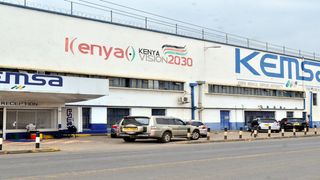
Kenya Medical Supplies Authority offices.
| Nation Media GroupAfrica
Premium
Agencies call for vetting of emergency health spending
What you need to know:
- Institutions designed to play an oversight role and ensure accountability of public actors should be protected and empowered, Transparency International and World Justice Project recommend.
- They note the coronavirus outbreak has unlocked unprecedented donor support to low and middle-income countries to help them cope with the public health crisis and economic crash.
Rewarding whistle-blowers, strengthening anti-corruption agencies, auditing financial flows and sanctioning governments that protect graft lords are among proposals to discourage looting of Covid-19 funds.
Institutions designed to play an oversight role and ensure accountability of public actors should be protected and empowered, Transparency International and World Justice Project recommend.
They note the coronavirus outbreak has unlocked unprecedented donor support to low and middle-income countries to help them cope with the public health crisis and economic crash.
The swift action required to counter the health crisis has, however, led to the suspension of certain requirements designed to guard against corruption, which they caution raises the risk of fraud.
The World Justice Project proposes public procurement mechanisms should be relaxed “only when a clearly defined urgency test is met and documented, and only to the extent necessary”.
“Experts argue that even in an emergency, anti-corruption approaches such as vetting suppliers, tracking financial flows and publicising complaint and whistle-blower mechanisms can be deployed to ensure public funds reach their intended beneficiaries,” reads a World Justice Project report on corruption and the Covid-19 pandemic.

Healthcare workers at the Mathari National Teaching and Referral Hospital in Nairobi in August 2020.
It recommends that all public contracts under emergency procedures should be promptly published openly because opaqueness encourages fraud.
While emergency measures may justify the “temporary relaxation” of some due diligence procedures, TI suggests that clear statements that there will be rigorous post-pandemic accountability for decisions taken and money spent during the crisis deter people looking to exploit the situation for private gain.
TI further suggests donors should also consider offering financial incentives to those who report misappropriation of their funds to discourage plunder of public resources.
“In light of growing concerns about threats against health professionals for speaking out about the realities of Covid-19, donors can also stress the importance of civic space, freedom of expression and whistle-blower protection in assisting timely and effective responses to the public health crisis,” the report notes.
“A free and independent media should be protected,” says World Justice Project. It adds that technology and principles of open and accountable governance can provide invaluable checks and hold corrupt actors to account.
Accountability lines
“Donors should establish formal and unambiguous lines of accountability for decision making,” says TI, citing its US chapter’s call for the appointment of an inter-agency anti-corruption task force to oversee the US government’s international response to the pandemic.
The groups say anticorruption laws, regulations, and best practices “provide guidance for taking swift action without compromising integrity”.
“Over the longer term, a recovery that includes measures to curb corruption promises to be more equitable and sustainable.”
TI’s report on the impact of Covid-19 on development assistance advises donors to prioritise “a sectoral approach to tackling corruption that places achieving health outcomes as the top priority and builds anticorruption into intervention design”.
WJP quotes the Chair of the OECD Working Group on Bribery in International Business Transactions, Drago Kos, as saying at a recent webinar discussion: “Governments thought the time was not right to fight corruption. Of course, they are terribly wrong. There always has to be time to fight corruption.
Seven ways Covid-19 funds are being stolen
- Illegal award of lucrative tenders to influential individuals in exchange for kickbacks.
- Inflating prices of medical supplies.
- Donated drugs/personal protective equipment diverted and sold on the black market.
- Diverting relief money meant for vulnerable households to pay illegal beneficiaries.
- Embezzling money for supplying air.
- Fraudulent billing for example for transport cost and accommodation.
- Soliciting informal payments from patients in exchange for treatment.





